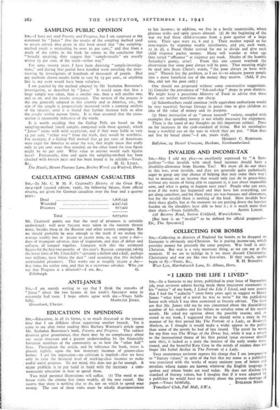SAMPLING PUBLIC OPINION
Sta,—I have not read Poverty and Progress, but I am surprised at the statement by " Janus " that the results of the sampling method used to secure certain data given in this book reveal that "the sampling- method result is misleading by over 20 per cent.," and that from a study of the tables in the book he comes to the conclusion that "broadly speaking, they suggest that ' sample-results ' are usually within 15 per cent, of the truth—either way."
For some twenty years I have been directing "sample-investiga- tions," and during that period have handled work entailing the inter- viewing by investigators of hundreds of thousands of people. Had my methods shown results liable to vary by 15 per cent., or anything like it, my work would have been valueless.
I am puzzled by the method adopted by Mr Seebohm Rowntree's investigation, as described by "Janus." It would seem that first a large sample was taken, then a smaller one, then a still smaller one, and so on, and the results compared. The reverse of the process is the one generally adopted in this country and in America, viz., the size of the sample is progressively increased (with a running analysis of the returns) until it is found that further increase fails to alter the results within narrow limits. It is then assumed that the cross- section is reasonably indicative of the whole.
It is worth recalling that the Gallup Polls are based on the sampling-method (small samples compared with those quoted), which " Janus " treats with mild scepticism, and if they were liable to vary 15 per cent. "either way" from the truth, they would be worthless. For example, if a Gallup Poll showed that 45 per cent. of Americans were eager for America to enter the war, that might mean that really only 30 per cent, were thus minded; on the other hand the true figure might be 6o per cent What value to anyone would such figures have? Fortunately, time and again the sampling-method has been checked with known facts and has been found tc be reliable.—Yours,


























 Previous page
Previous page